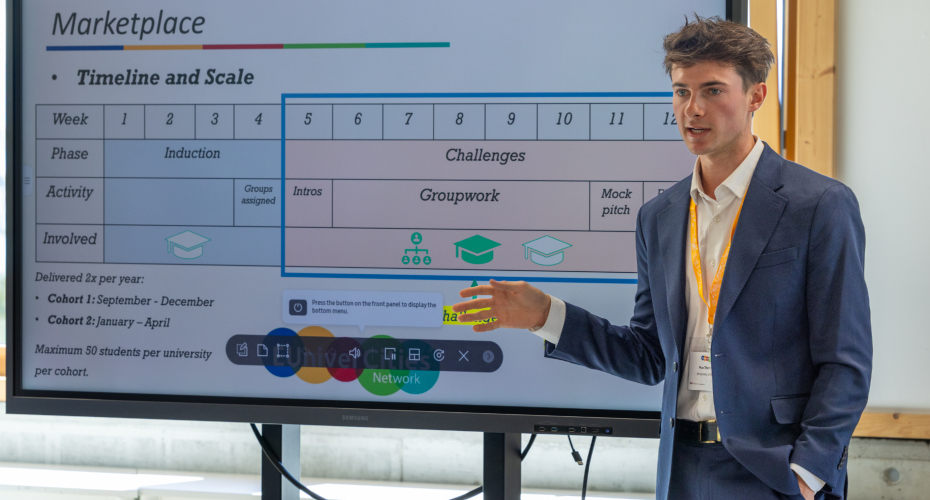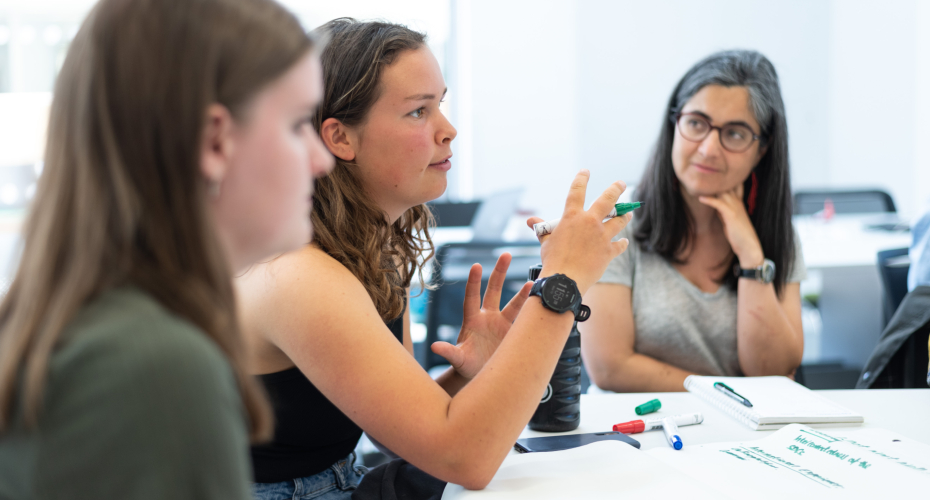Pioneering University-led global sustainability programme celebrated on SDG flag day

Max Thornton, who took part in the sixth cohort of Future17
The impact of a collaborative international programme co-led by the University, which enables students to tackle real-world sustainability challenges, has been hailed on SDG Flag Day.
The Future17 SDG Programme is a pioneering international initiative that connects students across six continents with real-world challenges aligned with the United Nations Sustainable Development Goals (SDGs).
Delivered in partnership by QS Quacquarelli Symonds and Exeter, Future17 is backed by innovative businesses, NGOs, and start-ups who bring their challenges and opportunities for the students to work on.
Now, with the launch of the 8th cohort, and to mark SDG Flag Day, programme leaders and students at the University have reflected on the impact of Future17 to date. Nearly 240 students have taken part since its launch in 2022, with the support of academic mentors from each of the partner institutions.
“Exeter students are working on time-critical sustainability partner challenges with a different and agile perspective, meaning the partner has an innovative piece of work that they may not have thought about in-house,” says Hollie Kirk, Lecturer in Applied Entrepreneurship, and academic lead for Future17. “If they take forward those recommendations, then our students have genuinely influenced the partners’ practices and made a real sustainability impact.
“At the same time, they are making international connections with other students and academic mentors, widening their network, and opening up to different cultures and disciplines. This is the only way we can solve some of the biggest sustainability challenges, by co-creating teams from all around the world and areas of expertise.”
Max Thornton, a final year student on the BSc Hons Business and Environment with Proficiency in Law, was a member of cohort 6 from 2024, and worked with the South African branch of Ernst & Young.
“It was an exciting and rewarding experience to contribute to such a meaningful project,” said Max. “It was a privilege to collaborate with people from across the globe on an issue that directly ties sustainability to the workplace of the future, especially as a student studying Business and Environment.
“I gained valuable experience in applying research methods to a real-world business challenge, while also enhancing my teamwork and communication skills. Most importantly, I’ve seen firsthand the complexity of working within international teams and organisations. Employers have found my participation in Future17 to be particularly appealing, as it demonstrates both practical experience in tackling real-world challenges and the ability to collaborate effectively within diverse teams.”

Among the projects that Exeter students worked on in 2025 were several that focused on North America. For example, one team, which also included students from Arizona, Stellenbosch, Hong Kong, and the Jiangsu province of China, produced a guidebook highlighting best practices for engaging young people on matters of public transportation in Canada, the United States and England.
Another team, comprising Exeter, Stellenbosch and Azerbaijan students, developed a spreadsheet and report for the US-based Cultural Heritage Economic Alliance to support marginalised small Black tourism businesses. And a third, explored issues around investment in wildfire innovation in the US, and developed two AI chatbots to help early-stage innovators obtain better access to the support they might need.
SDG Flag Day is an annual global event, celebrated on September 25th, which marks the anniversary of the United Nations’ adoption of the Sustainable Development Goals (SDGs). The day encourages businesses, governments, and civil society organisations to show their commitment to the SDGs by flying the SDG flag and raising awareness for these critical goals, which aim to create a more sustainable, equitable, and peaceful world.
Professor Tim Quine, Vice-President and Deputy Vice-Chancellor (Education & Student Experience), said: “As the world celebrates the 10th anniversary of the adoption of the UN Agenda 2030 for sustainable development, the Future17 SDG Programme offers students an opportunity to collaborate with like-minded counterparts across the globe to develop solutions to real-world sustainable development challenges. Since the programme was launched over 1,000 students have taken part, developing sought after 21st Century skills, cultural intelligence, global awareness, and a sustainability-first mindset — preparing them to become the changemakers our planet needs.”
More than 20 Exeter students – and a further 140 around the world – have already signed up for the eighth cohort, whose registration window is open until 3rd October. If you would like to register for either the eighth cohort, or the ninth, which will open in January, please visit the University website.




